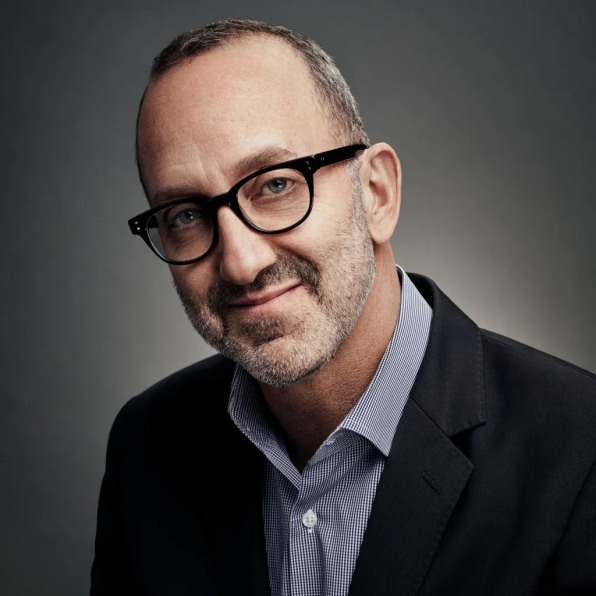- | 9:14 am
‘There’s nothing scarier than having a severe mental illness at work’: How to talk to colleagues about mental health
Jimmy Horowitz, a senior executive at NBCUniversal, describes what it’s like to disclose a mental illness at work.

This story is part of State of Mind, a special package covering mental health at work. For the series, Fast Company also convened a roundtable of business leaders and advocates to discuss how to bring compassion to the workplace, and published an excerpt of Bonobos cofounder Andy Dunn’s new memoir, Burn Rate, about growing his company while having bipolar disorder. We also looked at how Alicia Keys is expanding her business interests mindfully.
Jimmy Horowitz is the vice chairman of business affairs and operations for NBCUniversal, where he has worked for 30 years. In his job, he oversees global deals across film and television studios, television networks, and the streaming service, Peacock. Some of his recent accomplishments include, acquiring the rights to the IP for The Exorcist, luring director Christopher Nolan away from a longstanding partnership with Warner Bros., and forging a partnership with NBA star Steph Curry’s Unanimous Media. In 2019, everything seemed to be going well for Horowitz at work, but privately he was struggling with depression. After concealing it from his colleagues for some time, he decided to share his experience to support others who might be struggling and help the company’s efforts around mental health. Here, he talks about why he decided to speak up.
There’s this sense that if you’re on the creative side of show business, you’re a little more out there. There’s this willingness to talk about mental health struggles. There’s more acceptance. I don’t think that [the issue] has been addressed at all on the business side of the industry because there’s an expectation that you’re more by-the-book. Working in the corporate world, a truism has been [that] you don’t talk about personal stuff. That [approach] has served me well for the most part. I haven’t felt the need to be overly personal. I thought when people do that, sometimes it sort of takes the spotlight away from [their] work.

Jimmy Horowitz [Photo: courtesy of NBCUniversal]
I’ve been saying to people that 2020 was not the worst year of my life, 2019 was. Depression wasn’t something I dealt with until then; although I certainly dealt with things like fear of failure in law school, coming from a high-performing family. In 2019, my mother passed away, and I was dealing with some other stuff in my personal life. At some point, it became too much for me to deal with [using] the ways I had been [coping].
I don’t know how to describe it, but depression for me is when you just start to feel different. I didn’t feel right. I didn’t feel good. And because depression is so stigmatized and there is so much shame associated with it, you don’t know what to do [about it]. When that happens, or when what you’re trying to do to make things better—taking medication or seeing a therapist—isn’t working, your anxiety gets worse, and you feel more alone and afraid. I was able to find someone to help me, but it gave me a devastating sense of heartbreak for people who don’t figure it out or can’t get help. It’s really hard to just live with it.
During the pandemic, at NBCUniversal, we started realizing there was an epidemic in our workforce of issues like sadness, burnout, stress, anxiety, loneliness, and depression. It was rampant. Our industry had to pivot so many times. Our business was constantly challenged. We experienced the Great Resignation. So many people started quitting. Those issues came [to the fore] at a moment when we were having a lot of conversations about diversity, equity, and inclusion. I just thought, how can we consider ourselves an inclusive workplace if there’s this huge segment of our population [dealing with mental health issues] that isn’t really being included in this conversation?
When HR was looking for an executive sponsor [for the company’s mental health initiatives], I hadn’t yet shared my experiences with anyone. To me, these efforts were something I could lead, so I spoke to them privately. Now, I speak about them openly with the company.
I’ve been in this business for a long time, and I’ve always had colleagues, but I don’t have many true friends. When I was feeling better, I told my boss, Donna Langley, about the fact that I had depression and wanted to help lead the company’s mental health initiatives. I’ve worked with her for over 20 years, so she’s a friend, but she’s also my boss. She was supportive when I told her. But I told her when I was okay. Telling your boss when you’re not okay is a different thing. We need to figure out how to convince people within our organization that it’s okay [to tell someone at work] when you’re not feeling good.
When I told [Langley], she said to me, “I thought there was something going on with you, I just didn’t know how to ask.” As soon as I spoke to her, I felt better. I wish I’d said something earlier. I spent a long time being afraid that I was going to be found out. I didn’t want my bosses to think, “Well maybe we shouldn’t give Jimmy more work because he’s going through a hard time.” That’s the worst thing that could happen for someone like me. I can be a dealmaker and still be super compassionate—it’s not a weakness.
There’s nothing scarier than having a severe mental illness at work because, for so long, we’ve had no way to talk about it. There’s been no avenue. As a company, we’ve had programs where employees can get help. But as a senior executive, the last thing you want is to share [your struggles] with your management, because you just don’t know how they’re going to react to it. The truth is, none of us have been trained. There’s no booklet for how to respond. And everyone’s situation is different.
We’ve now partnered with Dr. Emily Anhalt, a clinical psychologist who has an organization called COA. She’s done a couple of company-wide seminars and webinars. One thing she taught us is that if you’re taking a day off for your mental health, you can say that you’re taking a mental health day. If you say it out loud, you normalize it.
When senior leadership is willing to talk about it, to open up about their struggles, they can make other employees feel like it’s safe [to do it as well]. As a leader, it humanizes you. We’re in a place where you can be compassionate and thoughtful—and also be driven and care about the net end results. It doesn’t have to be one or the other.
Learn more about how science explains that anger at work has a bright side. Here’s how to manage it.







































